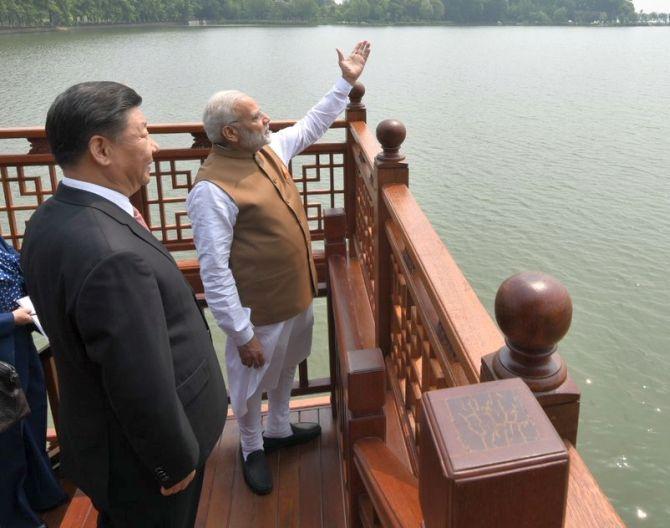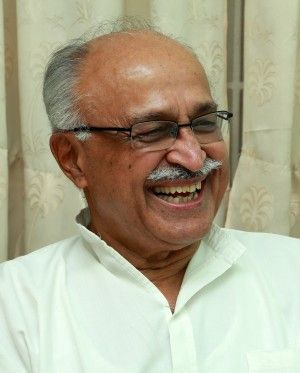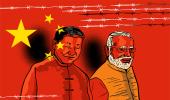'Even if such a thing happens, it will not prolong for many days like Doklam did.'
'That is because both the leaders do not want it.'

Will the informal two-day summit between Prime Minister Narendra D Modi and Chinese President Xi Jinping at Wuhan and their plan to meet three more times in 2018 introduce a new era in the India-China relationship?
Colonel R Hariharan, below, is a retired military intelligence specialist on South Asia who. He is also associated with the Chennai Centre for China Studies and the South Asia Analysis Group.
"The priority given by the two nations is how to take the agenda forward without coming into clash with each other," Colonel Hariharan tells Rediff.com's Shobha Warrier.
How do you look at the Modi-Xi meeting at Wuhan? Is it more business than politics?
If you see the open agenda they had, both sides have emphasised the word 'informal'. So, it was a free discussion of the two leaders.
After the Doklam debacle, it was to be a free discussion and they would have discussed many key issues.
And there was no joint statement this time.
But the statements by the Chinese foreign office and the ministry of external affairs have some common ground. The key issue I notice is that China recognises India's growth as an economic power.
The MEA statement also says Prime Minister Narendra D Modi and Chinese Premier Xi Jinping underline the importance of building an open, multipolar, pluralist and participatory global economic order which will allow all countries to pursue, develop and contribute to the elimination of poverty and inequality.
This is the sum total of the Wuhan meeting.
There is a big churning that has happened after Trump came to power.
The unpredictability of Trump is the reason why the two Koreas are also coming together.
So, it is an advantage for China if nuclear disarmament happens in the Korea peninsula as it provides a strategic cushion for China.
China is trying along with India, Russia and Brazil to bring in a new alternate world order which will not be dominated by the Western powers. Everything from the IMF to the World Bank is now dominated by the US and the European Union.
The priority given by the two nations is how to take the agenda forward without coming into clash with each other.
There are areas of competitive trade and competitive power play which can happen between any big powers.
India being a neighbour, China would not want this to happen now.
I think both Modi and Xi have timed the summit to suit their own requirement.
With a trade war imminent between the US and China, do you think this informal summit is significant for China because of the huge market that India is?
You will be surprised China has over 1,000 trade agreements with the US. There is no question of India replacing the US as a trade partner.
Investment in America is so much that China holds US government bonds in billions of dollars. You cannot sever China-US trade relations. They will manoeuvre somehow to adjust.
India, of course, is a big market, still untapped for China.
There is a huge infrastructure plan on which China has expertise in and money to invest, and it is competing with Japan.
If you look at the China statement, you will see a slight difference in emphasis; it starts by saying both sides agree with the view that the international landscape is undergoing a profound change. It has used the term, the 'new world order'.
Do you think the direction of the talks may have been on the new world order?
It cannot be. India has very close relations with the US, particularly in domestic security and Indian Ocean security. You cannot say, because of that, we are doing this.
We are also expanding our interests in the world, probably a little less than China.
For example, with Iran, India is trying to build relations and through that, enter the Central Asian markets.
In Africa, India is using French bases and this is done after the Macron visit. Macron wants India, Australia and France to join together for strategic security in the Indian Ocean.
Nobody is sure about what Trump would do next.
Do you think China's initiatives all around us -- the China-Pakistan Economic Corridor, the Maritime Silk Road Project in Sri Lanka, the Belt and Road Initiative in Nepal and Bangladesh -- are something to worry for India?
These are inevitable. China has got money and it is investing in these countries, which India cannot match.
At the same time, countries like Nepal have huge links with India which China can never substitute.
India provides a lot of employment opportunities to the people of Nepal.
Unless China opens its market with a competitive price, the trade balance will never be the same.
Nepal's infrastructure is very bad and China has the money and wherever there is a problem, China will leverage it to its advantage.
Is it to checkmate India?
Absolutely not. This is the mistake we are making. Whether you checkmate or otherwise, the Chinese will come.
In India itself, they have come and they are India' biggest trading partner.
For example, the mobile market in India is totally ruled by the Chinese. Like the US came earlier with a lot of money in the pocket, China is doing that.
The road initiatives, the Maritime Silk Road Project and the Belt and Road Initiative are also part of China's expanding interests.
To protect those interests, PLA (the People's Liberation Army) will follow and you will see China getting increasingly involved in these countries militarily. It will use it when there is a crisis.
In Pakistan, they are opening a second base. They will also ensure that the regime remains friendly to them.

Is China interested in these markets or are they going there because India is a big power in this area?
It is inevitable that the Indian market will be exploited. For example, India has a free trade agreement with Sri Lanka which is going quite well.
So, when China starts business in Sri Lanka with Chinese capital, they can export to India. You cannot stop it.
Colombo harbour is used by Indian ships and China has opened a modern carrier terminal in Colombo.
Today, India along with Japan are offering its own deals to Sri Lanka like the India-Japan power plant. Similarly, an India-Japan investment is happening in Africa also.
This is the strategy both India and Japan are using to counter China.
How much should India be worried?
It is not a question of worrying. The more powerful you become, the more you take care of your own security.
Pakistan has a strategic agreement with China and Chinese troops are protecting Chinese investments and interests.
Naturally, it will affect India's security perception. When you have a hostile neighbourhood, you have to take measures.
Prime Minister Modi has been visiting many countries including our neighbours. Do you think we have better relations with everyone now except perhaps Pakistan?
I would say we have the best relations with our neighbours now.
You should not compare our neighbour's relations with China.
You should not think that just because Nepal has better relations with India, it shouldn't have good relations with China.
Bangladesh has very good relations with China for many years. When India refused to supply arms to them, China has been the main arms supplier to Bangladesh.
As long as your border disputes with China are unresolved, Nepal and Bangladesh are very vital to Indian security.
India is vulnerable in the east.
In the statement after the Wuhan summit, China has mentioned that it will try to resolve the border disputes by holding talks.
Many experts say China can never trusted. On one side, you may have such friendly informal talks, but on the other side, there can be a Doklam.
Do you think China cannot be trusted?
I would say, there are no permanent friends, there are only permanent interests.
I attach symbolism to this meeting. Chinese also has this symbolism.
At the same location, the Nixon-Mao meeting took place. Obama also came to Wuhan.
Wuhan is a historical place and now, Modi also has come to this place. It is not the case with the earlier meetings of all the others.
It showed the level of confidence China has in India.
For a long time, India had been cribbing that China did not recognise India as an equal partner.
Through the meeting, China sent the signal that we do recognise the importance of India though not on par.
Do you think it was a positive step in India-China relations?
After Doklam, China must have been surprised by India's strong reactions.
They are now trying to take the confidence both countries have for each other to a higher level.
The objective of the meeting also was to enhance trust.
Is that why they have established a hotline between the two militaries?
Yes. Confidence building will come through at two levels.
One is through diplomacy and the other is military diplomacy.
Will we have good relations with China or will it always be bitter-sweet?
We are having normal and good relations with China now. The problem is, both India and China have media which focus only on the negative aspects.
The positive aspect is there are less chances of a Doklam happening now and even if such a thing happens, it will not prolong for many days like Doklam did. That is because both the leaders do not want it.
The visa regime has to go now. Indian tourists are going to China, but not the other way around.
Businesses have to open up in China. Then only, I will say we have a truly happy relationship.
Also, there has to be a balance of trade which at present is in favour of China.
When China invests more in India, there will be a change.
It is a fact that for stability in South Asia, China has to have a good workable relationship with India.
That doesn't mean you wish away the problems; they will be there.










